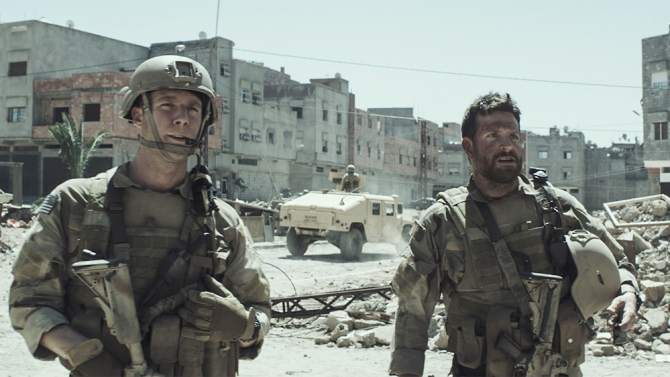
By Ben Burnum
Flaring emotions are a rational response to a film that is centered on guns, war and death. “American Sniper” follows Navy SEAL Chris Kyle, who served four tours in Iraq and has been called the most lethal sniper in U.S. history. The film has fueled controversy due its perceived conservative political bent and questions about whether or not Kyle’s war deeds should be publically celebrated. Much of this controversy has played out on social media. On Twitter, actor Seth Rogen compared the film to Quentin Tarantino’s satirical Nazi sniper propaganda in “Inglorious Basterds”. Director Michael Moore tweeted that he was taught snipers were cowards, not heroes.
Indeed, these controversies have traversed through the hearts and minds of the beholders, and morphed into opinions on Facebook pages and Twitter feeds. The computer screen is mostly where we now see people practicing their right to freedom of speech. On the issue of “American Sniper” especially, it seems like everyone on my Facebook has something to say. Even with all of the politicized rants and patriotic testaments on Facebook and Twitter, have we really heard all the opinions? What about the opinions from actual military personnel?
The ability to exude passion is taken for granted in America. The right to speak freely and be confident in what you say is something 99 percent of Americans are able to do. That missing 1 percent, the men and women in the U.S. Military and local and federal police forces, cannot freely express their views and opinions as normal citizens can. Within the military and police ranks it is frowned upon to spout your political opinions or ideological beliefs in a public setting.
During political controversies or social disputes, a service member is limited in what he or she can say and do. This happens for two reasons. The first reason is because a norm exists within the military that personnel need to be disciplined in their speech and ideas. They are usually ordered to not publically align with any political ideology. The other reason is founded on more of a structural basis. Every serviceman is subject to The Uniform Code of Military Justice (UCMJ), which is a code of law that punishes the violations of principles like conspiracy, contempt towards officials, insubordinate conduct, and cruelty and maltreatment. These are just five of the 146 articles that the UCMJ could potentially use to convict a service member if he or she were being too polarizing or overtly passionate and carefree in what they wrote on Facebook and Twitter.
These offenses would not normally be problems in civilian life, but they are made offenses in a military justice system because the misconduct “goes to the heart of military duties.” The laws and guidelines within the UCMJ are stringent and straightforward, and the misconduct that “goes to the heart of military duties” can manifest in a military member speaking his or her opinions even on a film like “American Sniper.” If a military individual gets tried and convicted under UCMJ they could lose rank, get court-marshaled, or go to prison.

I agree with this system. I believe that professionalism above all else while wearing a service uniform with the American flag on the right shoulder is of the upmost importance. The military runs as a team, and individualized ideas and opinions sometimes have to be avoided in order for the team to run smoothly and succinctly. Bluntly, military personnel are not in the business of opinion.
Because of the UCJM, it is rare to see a serviceman get wrapped up in political or ideological discussions on social media, the contemporary outlet to practice freedom of speech. This is why only prior military personnel have been at the forefront in defending “American Sniper” against its backlash from left-leaning pundits and political commentators. Current servicemen have an obligation to restrict themselves from politicization. Not only is a public political statement frowned upon in the military community, but it can also give way to a potential UCMJ hearing.
As an ROTC cadet and a future Army officer, I have pondered both the structure of UCMJ and the norms within the military community that call for me to refrain from some of the things I say. I see the expectation to be disciplined for my speech as an important facet and defining feature of military life instead of a limiting factor. Some would say this is an example of complacency, but it is how I show reverence to the organization I am a part of. It is the recognition of the importance of professionalism in keeping that organization going and keeping the country strong. It is a considerate way to represent everyone while wearing the uniform.
It is important for all of us to keep in mind that rarely will we ever hear a serviceman or woman comment on politics. There are few occasions when this does happen, but for the most part those who defend our freedom of speech, are not able to fully practice theirs. Americans need to be cognizant of the sacrifices that servicemen make beyond the battlefield and deployments. They must display a quiet dignity when controversy about the military erupts and always remember that that the team and the mission are more important than their opinions.


